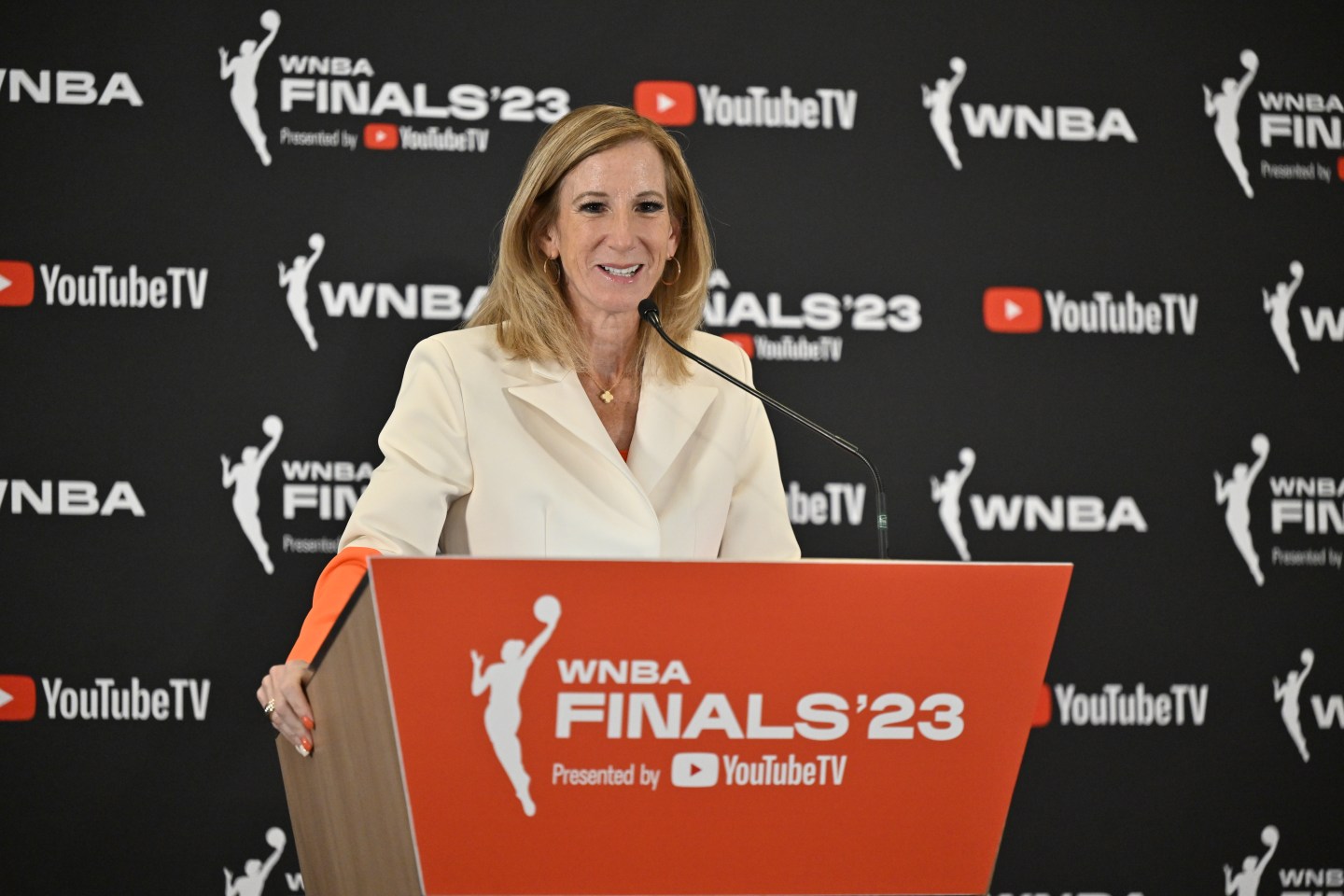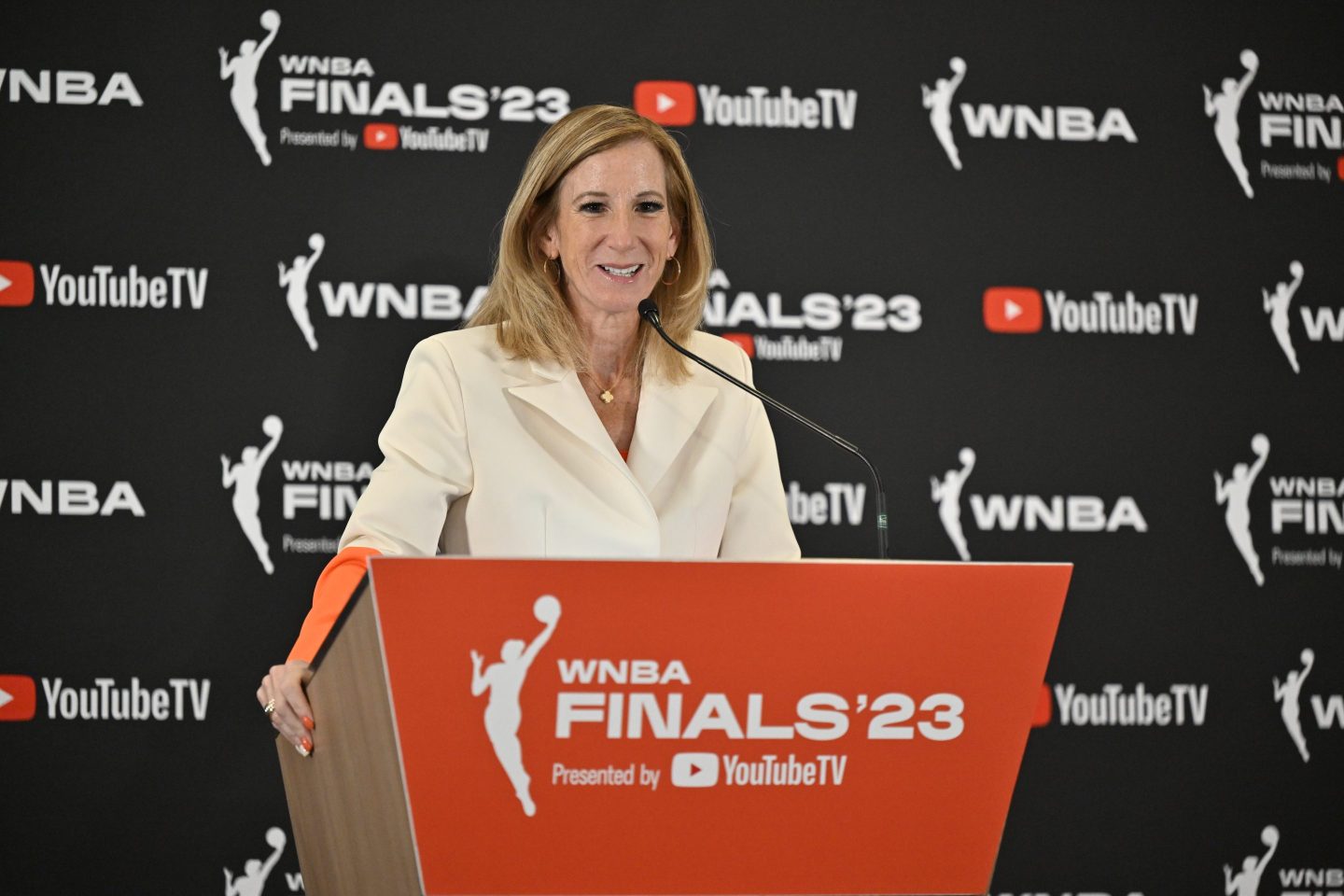Good morning, Broadsheet readers! The second Anita Hill report on workplace abuse in the entertainment industry is out, Japan’s foreign minister is reportedly a top pick to become the country’s first female prime minister, and WNBA commissioner Cathy Engelbert talks about what’s ahead for the league. The Broadsheet will be back on Tuesday after MLK Jr. Day; enjoy your weekend!
– On the court. Since pivoting from a 33-year career at Deloitte, which culminated in becoming CEO, to a role as WNBA commissioner, Cathy Engelbert gets asked all the time how to pursue a career in sports.
She advises young people who ask her how to get into the industry to do something else first. “Sports, at lower levels—it’s a turn; it’s a grind,” she says. “At the higher levels, you can be really successful if you have a good business background.”
Like any industry, sports “is about relationships,” Engelbert says. “It’s a big business and you’ve got to find ways to grow revenue. You’ve got to find ways to deploy your capital. You have to hire great people.” Her skill set in those areas, as well as strategy and scenario planning, prepared her better than anything else for running a growing women’s sports league, she says.
Engelbert understands why so many people want to work in sports. Her personal passion for women’s sports gives her the drive to execute those business goals. She played basketball in college and her father was an NBA player for the Detroit Pistons, drafted in 1957.

However, she tells interested investors, too, that more than passion is needed. “You can’t just go out there and raise capital because there’s a lot of momentum around women’s sports. You have to have a vision, you have to have a strategy, and there has to be an economic model that’s going to sustain it for the long term,” she says.
Her strategy for the WNBA has three prongs: “player-first, stakeholder success, and fan engagement.” Since taking over the league, Engelbert has raised $75 million in capital, tapped her Deloitte experience for a digital revamp, and announced the forthcoming launch of a Bay Area franchise (with more expansion expected in 2024).
“The tough part of women’s sports continues to be the undervaluing of our assets,” Engelbert says. The WNBA’s media rights deal is up for renegotiation in the fall of 2025. After the recent ESPN-NCAA deal, which valued women’s college basketball 10 times greater than its last agreement, prospects look good.
The exciting Las Vegas Aces-New York Liberty face-off in the WNBA finals late last year proved to the commissioner that the league’s strategy is succeeding. The final sparked debates around rules for players and teams—like whether players can fly private to games. Restrictions in place rankle players and team owners but are meant to level the playing field in a league where teams have vastly different resources.
“I love the debate,” Engelbert says. “Because it’s great to be having those kinds of conversations versus, ‘Is this league going to survive?’ Now, we’re moving from survive to thrive.”
Emma Hinchliffe
emma.hinchliffe@fortune.com
@_emmahinchliffe
The Broadsheet is Fortune’s newsletter for and about the world’s most powerful women. Today’s edition was curated by Joseph Abrams. Subscribe here.
ALSO IN THE HEADLINES
- #MeToo revisited. The second Anita Hill Workplace Abuse survey found that workers in the entertainment industry are better able to identify sexual harassment, but a majority of respondents still believe “minimal/no progress” has occurred in addressing the problem in Hollywood. Hollywood Reporter
- Ready for primetime? Japanese Foreign Minister Yoko Kamikawa, who’s served in multiple senior government positions over 24 years, is reportedly receiving behind-the-scenes support to assume the country’s prime minister position as corruption allegations hit other members of her LDP party. South China Morning Post
- The human touch. Best Buy CEO Corie Barry told Fortune CEO Alan Murray this week that AI will “humanize” technology by making devices a seamless part of everyday life. Barry also challenged the notion that electronics are a discretionary category: “I’m sorry, how many of you can go one hour of your day without some consumer electronics device?” Fortune
- Another Epstein name. Court documents released this week from a 2015 lawsuit against Jeffrey Epstein included a deposition from Virginia Giuffre, an alleged victim, who described multiple sexual encounters with L Brands founder and former Victoria’s Secret CEO Les Wexman. In response, Wexman's team referenced past denials of any wrongdoing or knowledge of Epstein’s activities when the documents were released. The Columbus Dispatch
- As seen on TV. From kitchenware made by Dolly Parton to a new hair-care line from Beyoncé, celebrities are hoping to turn their names into name-brands with product releases in 2024. Kim Kardashian’s Skims is set to open its first physical stores and launch a possible IPO filing, Gal Gadot is looking to expand the offerings of her Goodles macaroni and cheese line, and the D’Amelio sisters want to hook people on their footwear and popcorn lines. Bloomberg
MOVERS AND SHAKERS: BlackRock has promoted Rachel Lord to head of all international business across Europe, the Middle East, India and Asia-Pacific.TrailRunner hired Anan Ibrahim as a director. GetYourGuide appointed Genevieve Vancutsem-Zednik as chief people officer. Sandlot Technology announced Malaika Underwood as chief executive officer. The Clooney Foundation for Justice named Emma Lindsay as co-chief executive officer.
ON MY RADAR
Naomi Osaka, the comeback interview: A tale of pregnancy, fear and a ballerina The Athletic
How Kristen Stewart became a queer trailblazer Variety
Is what’s good for Taylor Tomlinson’s career bad for her life? The New York Times
PARTING WORDS
"Finding the confidence made me realize, 'Wait, this is my responsibility to take up this space on the planet.'"
—Actress Julia Roberts describing how she found the power to stand up for herself
This is the web version of The Broadsheet, a daily newsletter for and about the world’s most powerful women. Sign up to get it delivered free to your inbox.













